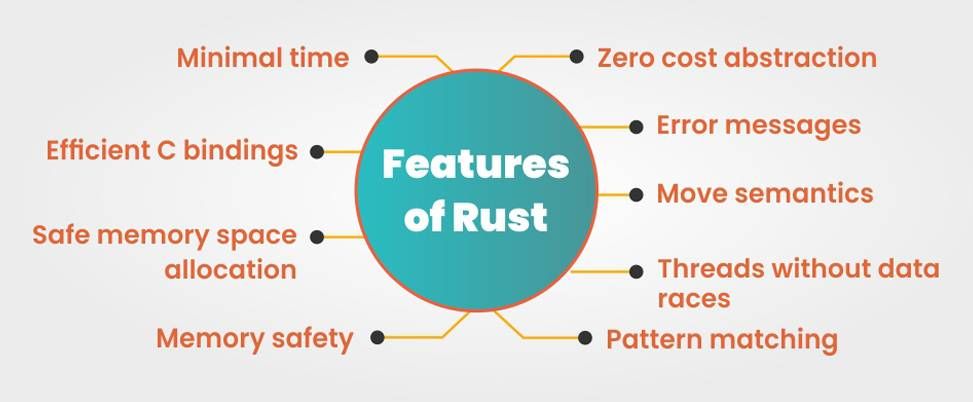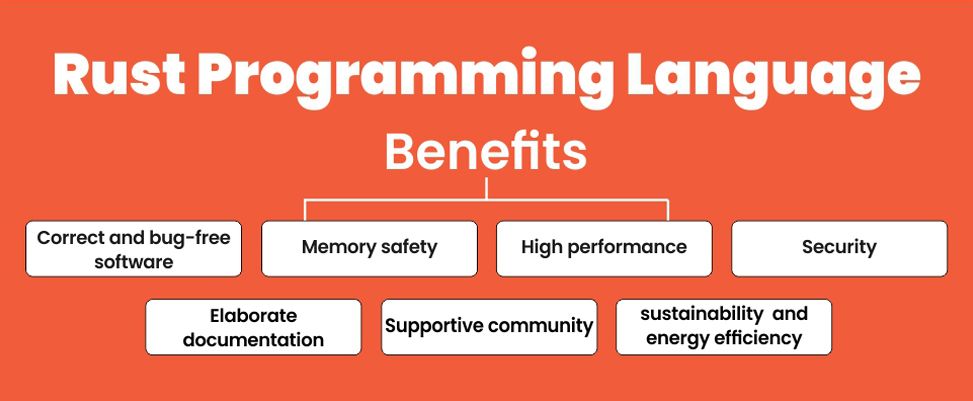Table of Contents
ToggleIntroduction
Developed by Mozilla, Rust is gaining popularity for its unique set of features that address common programming challenges. These features also deliver significant benefits to developers and projects. Rust has found its place in the field as one of the newer languages used for developing production-level code in real enterprises.
It helps systems programmers and developers to deal with a multitude of concurrent events. Thus, making it a valuable tool for creating complex systems. Rust brings practicality to the deep theoretical concepts of system development. Consequently, it has got the image of a living and functional language that helps developers build robust and bug-free solutions.
In this blog, we will explore the key features and advantages of Rust. Also, we will highlight why Rust has become a go-to choice for various applications.
Must read: Why Is Rust a Popular Programming Language?
Features of Rust Programming Language
Rust is the best programming language with several features that make it stand out.

- Efficient Abstraction: Rust developers can use abstractions in the code without sacrificing performance. Consequently, it enables you to write clean and easy-to-understand code that runs efficiently.
- Clear Error Messages: Rust provides clear and informative error messages. Moreover, it goes beyond the standard to suggest possible misspellings in your code. Thus, making it easier to find and correct mistakes.
- Automatic Type Inference: Rust can automatically determine the data type of an expression. It eliminates the need for explicit type declarations thus speeding up the coding process with fewer errors.
- Smart Move Semantics: Rust’s move semantics efficiently transfer data between variables, thus avoiding costly copies. This feature is particularly beneficial for handling temporary objects.
- Thread Safety: Rust’s ownership system ensures that threads cannot access the same memory simultaneously. Thus, it prevents data races that can cause serious issues in multi-threaded programs.
- Versatile Pattern Matching: Rust’s pattern matching feature gives you more control over program flow by allowing you to match various patterns, such as literals, arrays, enums, structs, variables, wildcards, and placeholders.
- Reliable Memory Safety: Rust’s ownership concept guarantees memory safety. It, thus, strikes a balance between C’s low-level memory control and Java’s garbage collection. It also ensures memory safety at compile-time, reducing potential errors.
- Compatibility with C: Rust can easily communicate with C APIs. Consequently, it allows you to leverage existing C code while benefiting from Rust’s ownership system and memory safety guarantees.
- Controlled Memory Allocation: Rust’s manual memory management allows developers to have explicit control over memory allocation and deallocation. Smart pointers efficiently handle memory cleanup, resulting in safer memory management.
With these features, Rust empowers developers to write high-performance, reliable, and safe code, making it a compelling choice for a wide range of programming projects.
Also read: Difference Between C and C#
| ✅ Pros | ❎ Cons |
|---|---|
| Memory safety | Steeper learning curve |
| High performance | The borrow checker can be restrictive |
| Concurrency support | Limited ecosystem and libraries |
| Zero-cost abstractions | Longer compile times |
| Pattern matching | Relatively smaller community |
| Excellent error handling | Fewer resources for learning and support |
| Fearless concurrency | Frequent updates and breaking changes |
| Cross-platform compatibility | Less mature tooling compared to some other languages |
| C/C++ interoperability | Complex error messages |
| Strong static typing | Asynchronous programming can be challenging |

Don't miss out on your chance to work with the best
apply for top global job opportunities today!
What are the benefits of using Rust programming language?

Using the Rust programming language offers several benefits:
- Memory Safety: Rust’s ownership and borrowing system ensures memory safety. It prevents common memory-related errors like null pointer dereferences, buffer overflows, and data races. This feature, thus, helps Rust developers write safer and more reliable code.
- Concurrency Support: Rust has built-in support for concurrent programming. Thus, making it easier to write safe and efficient multi-threaded applications. The ownership system prevents data races, reducing the risk of concurrency bugs.
- Performance: Rust is designed to deliver high performance, comparable to low-level languages like C and C++. It achieves this by providing fine-grained control over hardware resources without sacrificing safety.
- Expressive Syntax: Rust features a modern and expressive syntax with pattern matching, algebraic data types, and other powerful constructs. This enhances code readability and reduces boilerplate.
- No Garbage Collection: Unlike many other safe languages, Rust does not rely on garbage collection for memory management. This leads to predictable and efficient memory usage without incurring garbage collection overhead.
- Cross-Platform Support: Rust is designed to work seamlessly across different platforms. Thus, it is an excellent choice for developing applications. Specifically, applications that need to run on multiple operating systems.
- Strong Community and Ecosystem: Rust has a growing and passionate community that actively contributes to its ecosystem. This results in a rich collection of libraries, tools, and resources to support Rust developers in their projects.
- Safety Without Sacrificing Control: Rust provides safety. It also offers control over low-level resources. These features make it suitable for a wide range of applications, including systems programming, web development, and more.
- Futureproofing: Rust focuses on safety and performance. Thus, increasing its chance to remain relevant and well-supported in the future.
Top Companies that Use Rust Programming Language
- Facebook: Rust is used by top social networking websites to manage various projects, including the disputed Libra cryptocurrency and blockchain.
- Cloudflare: A top web infrastructure and website security company Cloudflare uses Rust for its excellent support for WebAssembly support.
- Dropbox: A personal cloud and client software service that uses Rust to improve the data center, and syncing engine, and create components for its storage systems.
- Figma: A software company Figma uses Rust for its remarkable speed and security on its servers.
- Amazon Web Services (AWS): AWS uses Rust for its high-performance, secure infrastructure networking and Firecracker projects.
Take control of your career and land your dream job
sign up with us now and start applying for the best opportunities!

Conclusion
Rust is an open-source programming language that is relatively new and evolving. There are ongoing discussions about its strengths, such as its approach to asynchronous coding and memory management without garbage collection. As developers continue to explore Rust, they are learning its intricacies and discovering the most effective ways to use it.
Wether Rust is the best choice for your specific project or not is debatable. It offers exciting possibilities for exploration and encourages us to think differently about problem-solving and writing modern software.
Learning Rust can be a stimulating experience. It will challenge your thinking and allow you to approach programming in innovative ways. Overall, Rust presents a compelling option for developers looking to try something new and embrace the opportunities it offers. If you’re a Rust programmer and searching for a role, then sign up for Olibr and never miss any opportunity.
Read more: C# vs. C++ for Web Development
FAQs
Rust is considered hard and complex due to the concepts of ownership and borrowing. It has a strict syntax. Due to this, it is not advisable to begin with Rust if you are new to programming.
Some of the real-life uses are computer graphics, file systems, virtual reality systems, browser components, and operating systems.
Yes, it is. Because Rust has gone through many changes and improvements, it is now widely used with Blockchain. So eventually, it will be the go-to programming language.
The major innovations in Rust are robust security and memory safety features and zero dependence on garbage collection.

